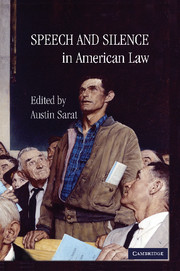Book contents
- Frontmatter
- Contents
- Contributors
- Acknowledgments
- Introduction: Situating Speech and Silence
- 1 “Our Word Is Our Bond”
- 2 Powell's Choice: The Law and Morality of Speech, Silence, and Resignation by High Government Officials
- Comment on Chapter 2 Resignations, the (Quasi) Plural Executive, and a Critical Assessment of the Unitary Executive Theory
- 3 Anonymous: On Silence and the Public Sphere
- 4 Freedom of Expression, Political Fraud, and the Dilemma of Anonymity
- 5 Speech, Silence, the Body
- Index
- References
Comment on Chapter 2 - Resignations, the (Quasi) Plural Executive, and a Critical Assessment of the Unitary Executive Theory
Published online by Cambridge University Press: 04 August 2010
- Frontmatter
- Contents
- Contributors
- Acknowledgments
- Introduction: Situating Speech and Silence
- 1 “Our Word Is Our Bond”
- 2 Powell's Choice: The Law and Morality of Speech, Silence, and Resignation by High Government Officials
- Comment on Chapter 2 Resignations, the (Quasi) Plural Executive, and a Critical Assessment of the Unitary Executive Theory
- 3 Anonymous: On Silence and the Public Sphere
- 4 Freedom of Expression, Political Fraud, and the Dilemma of Anonymity
- 5 Speech, Silence, the Body
- Index
- References
Summary
Professor Seidman has thoughtfully and comprehensively surveyed the moral, political, and legal implications of an executive branch officer's resignation in response to a presidential directive with which an executive-branch officer disagrees. Moreover, his taxonomy of eight options – starting with the weakest response of remaining in office and simply acceding to the policy, through intermediate options and concluding with the strongest possible response of noisily and publicly resigning – represents an almost complete menu of options open to an executive-branch officer who disagrees with her boss, the President, about a policy matter. Professor Seidman's taxonomy, however, does not include an additional, ninth option: remaining in office, but refusing to implement the President's policy.
One's immediate reaction to this proposed addition might be to dismiss it out of hand; after all, if a presidential appointee serves at the will of the President, how could a cabinet secretary refuse to implement a clear presidential order? The most direct answer: an appointee categorically opposed to a policy could force the President to exercise his power of removal by firing the official. In other words, Secretary of State Colin Powell could have considered taking a page from Nancy Reagan's playbook and “just sa[id] no” when asked to give his Iraq war presentation at the United Nations. Strictly speaking, President George W. Bush could not force Secretary Powell to give the speech, nor could President Bush force Powell to resign (whether loudly or quietly).
- Type
- Chapter
- Information
- Speech and Silence in American Law , pp. 83 - 105Publisher: Cambridge University PressPrint publication year: 2010



